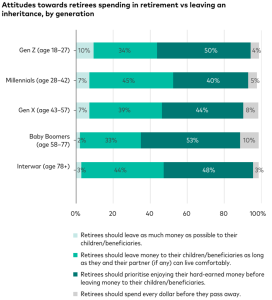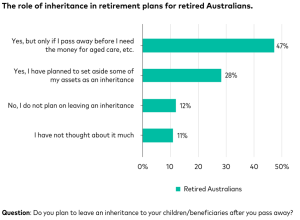Spending your kids’ inheritance
By Tony Kaye, Senior Personal Finance Writer
Retirement
Many Australians expect an inheritance, but their parents may have a different view.
Around one in two Australians have received or expect to inherit money or property, either from their parents or others.
That’s one of the key findings from Vanguard’s 2024 How Australia Retires research, but it shouldn’t come as a great surprise.
Over the coming years trillions of dollars of assets are likely to be shifted from the estates of deceased older Australians to their children and other heirs. Most of this will be in the form of residential real estate, unspent superannuation savings, and other investment assets.
But, when it comes to leaving inheritances, it’s clear there are differing views across generations on whether parents should spend as much as they can before they die or conserve their spending so more assets can be passed on to their children.
Vanguard surveyed more than 1,800 working and retired Australians aged 18 years and over in March this year and asked them about their attitudes towards retirees spending their money versus leaving an inheritance.
Almost half of the people surveyed said they believe retirees should prioritise their own spending before leaving money to their children or beneficiaries.
But behind that number is a general expectation by 38% of the survey respondents that retirees should leave money aside for inheritances, as long as they can live comfortably.
Only 6% of those surveyed said that leaving an inheritance should be the primary goal for retirees, and that they should leave behind as much money as possible to their heirs.
About the same percentage (7%) believe retirees should spend all of their money (SKI) before they pass away.
What generations are thinking
What’s quite interesting are the differing attitudes across generations on whether retirees should spend the kids’ inheritance (go “SKI”ing) or keep money aside for their beneficiaries.
10% of Baby Boomers (aged 58 to 77) in Australia believe retirees should spend all of their money in retirement, while 10% of Gen Z (aged 18 to 27) believe retirees should leave as much money as possible to their children/beneficiaries.
At the other end of the spectrum, more Millennial (aged 28 to 42) and Gen X (aged 43 to 57) Australians than older generations believe retirees should leave as much money as possible to their children and beneficiaries.

Most retirees want to leave an inheritance
When it comes to incorporating inheritances into retirement planning, 47% of retirees plan to do so.
But most retirees surveyed said they could only do so if they passed away before they needed their money for aged care and other expenses.
28% of retirees, on the other hand, have planned to set aside some of their assets as an inheritance, while 12% said they do not plan to leave an inheritance at all.
Superannuation death benefits on the rise
The conversation around inheritances interweaves with Australian government research that many Australians are not exhausting their superannuation savings before they die.
The 2023 Intergenerational Report found that most retirees draw down at the legislated minimum drawdown rates.
“This results in many retirees leaving a significant proportion of their balance unspent, for example, a single retiree drawing down at the minimum rates would be expected to still have a quarter of their retirement assets at death,” the report noted.
Additionally, the 2020 Retirement Income Review included projections from Treasury that outstanding superannuation death benefits could increase from around $17 billion in 2019 to just under $130 billion in 2059, assuming there’s no change in how retirees draw down their superannuation balances.
This is where good estate planning, using the services of professionals such as a lawyer, financial adviser, and a tax practitioner, really comes to the fore.
For example, leaving superannuation to non-dependents can have tax consequences for beneficiaries.
There’s a lot to be said for having open discussions within your family about the intended treatment of assets and future inheritances.
Beyond accumulating wealth over time, one of the most important aspects of estate planning is determining in a legally valid will how you intend to have your accumulated wealth distributed after your death.
View the full 2024 How Australia Retires report.



